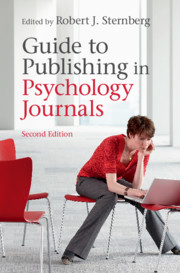Book contents
- Guide to Publishing in Psychology Journals
- Guide to Publishing in Psychology Journals
- Copyright page
- Contents
- Contributors
- Preface
- Part I Kinds of Articles
- Part II Parts of Articles
- Chapter 3 Titles and Abstracts
- Chapter 4 Introducing Your Research Report
- Chapter 5 Theories and Hypotheses
- Chapter 6 Writing about Methods
- Chapter 7 Data Analyses that Meet Current Standards of the Profession
- Chapter 8 Results that Get Results
- Chapter 9 Writing the Discussion Section
- Chapter 10 References
- Part III The Journal Submission and Resubmission Process
- Part IV Systemic Issues
- Part V Conclusion
- Index
- References
Chapter 9 - Writing the Discussion Section
from Part II - Parts of Articles
Published online by Cambridge University Press: 19 November 2018
- Guide to Publishing in Psychology Journals
- Guide to Publishing in Psychology Journals
- Copyright page
- Contents
- Contributors
- Preface
- Part I Kinds of Articles
- Part II Parts of Articles
- Chapter 3 Titles and Abstracts
- Chapter 4 Introducing Your Research Report
- Chapter 5 Theories and Hypotheses
- Chapter 6 Writing about Methods
- Chapter 7 Data Analyses that Meet Current Standards of the Profession
- Chapter 8 Results that Get Results
- Chapter 9 Writing the Discussion Section
- Chapter 10 References
- Part III The Journal Submission and Resubmission Process
- Part IV Systemic Issues
- Part V Conclusion
- Index
- References
Information
- Type
- Chapter
- Information
- Guide to Publishing in Psychology Journals , pp. 112 - 119Publisher: Cambridge University PressPrint publication year: 2018
